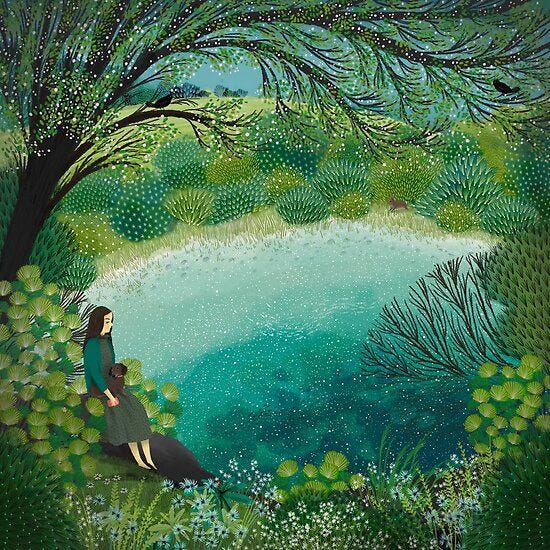Joy Is The Condition Of Life
"Wonder - is not precisely Knowing." Emily Dickinson
(art by Jane Newland)
Recently, I have returned to the writings of Ralph Waldo Emerson and Henry David Thoreau. Over the summer, I made a pilgrimage to Amherst and Concord, Massachusetts specifically to visit the homes and graves of Emily Dickinson, Louisa May Alcott, Emerson and Thoreau.
This morning, I took my copy of Thoreau’s Natural History Essays with me to the doctor’s office as I waited to have a yearly physical. As I sat in the waiting area, reading, I came across this line from Thoreau, “Surely joy is the condition of life.” It was a line I could have easily passed over in its simplicity but, this morning, it struck hard at the very heart of my being. My first reaction was: Is it? Is it really?
Certainly if one was to look at the state of affairs in this world, one would find such a sentence dubious and doubtful. Yet as I continued to read the essay, he began to persuade me, “When I detect beauty in any of the recesses of nature, I am reminded by the serene and retired spirit in which it requires to be contemplated, of the inexpressible privacy of life, - how silent and unambitious it is. The beauty there is in mosses must be considered from the holiest, quietest nook.”
His reference to moss brought to mind one of my favorite books, Gathering Moss: A Natural and Cultural History of Mosses, by Robin Wall Kimmerer. In it she writes, “There is an ancient conversation going on between mosses and rocks, poetry to be sure. About light and shadow and the drift of continents. This is what has been called the "dialect of moss on stone - an interface of immensity and minute ness, of past and present, softness and hardness, stillness and vibrancy, yin and yan.”
There is a silent conversation going on in the natural world to which only by being present, by noticing, by looking and listening can we become privy to the poetry and beauty of it as Thoreau and Robin Wall Kimmerer are. In fact, she often sounds like Thoreau when she writes,“I am trying to understand what it means to own a thing, especially a wild and living being. To have exclusive rights to its fate? To dispose of it at will? To deny others it’s use? Ownership seems a uniquely human behavior, a social contract validating the desire for purposeless possession and control.”
The joy and poetry in life of which they write is not that which our culture and society of productivity, commercialism, consumerism, and utilitarianism prizes. Too often society’s view of success is rooted solely in these things: how much money, possessions, power, and prestige one has accumulated and acquired. Thoreau, however, is countercultural to this vein of thinking. He writes, “If the day and night are such that you greet them with joy, and life emits a fragrance like flowers and sweet-scented herbs, is more elastic, more starry, more immortal - that is your success.”
Some would dismiss him, pointing out that he lived on land owned by Ralph Waldo Emerson, who allowed him to build the small cabin near Walden Pond. Or that Thoreau’s own mother still washed his clothes for him. Or that Walden Pond was only a twenty minute walk from town. Why did he even go there?
We picture it as a peaceful solitude where he wrote Walden but he didn’t actually write that book until seven years later. No, why he went there is to reconstruct his life and separate himself from social distractions and to deal with the despondency that was overtaking him. In fact, Thoreau’s depression was such that it nearly drove him to the brink of suicide. How then does one take the idea that “…joy is the condition of life?” Was this mere wishful thinking on Thoreau’s part?
As someone who has been diagnosed with depression and, like Thoreau, has been near the brink of taking my own life, I would say that he understands that joy is not fleeting happiness. Joy is active. To notice the beauty of mosses, is to be searching for beauty, for wonder because those remind us that there is more to life than our pain.
Keep reading with a 7-day free trial
Subscribe to Begin In Wonder Substack to keep reading this post and get 7 days of free access to the full post archives.


